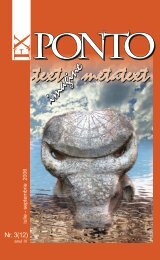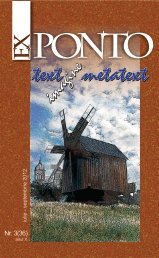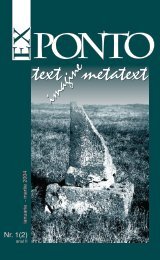Nr. 3 (32) anul IX / iulie-septembrie 2011 - ROMDIDAC
Nr. 3 (32) anul IX / iulie-septembrie 2011 - ROMDIDAC
Nr. 3 (32) anul IX / iulie-septembrie 2011 - ROMDIDAC
You also want an ePaper? Increase the reach of your titles
YUMPU automatically turns print PDFs into web optimized ePapers that Google loves.
Baile Beag means small town; it is a typical rural community whose old Irish<br />
traditions, values and culture have been eroded form the eighteenth century<br />
to the present. The creation of Ballybeg may integrate in the Irish tradition<br />
of the dinshenchas, i.e. place-name poetry, expressing the lore of the place,<br />
the beauties of nature and local narratives. The location is typically Irish – an<br />
imaginary place in a real county, Donegal, a rural, western and poor area. It<br />
is August 1936, in the house of the Mundy sisters, all unmarried and aged<br />
between 26 and 40, Kate, Maggie, Agnes, Rose and Christina; there are also<br />
Jack, their brother, Michael, Christina’s son and Gerry, Michael’s father. The<br />
sisters are mostly seen in the kitchen of their home, a stereotypical location<br />
of the Irish plays in the 1950s.<br />
One of Friel’s theatrical modes is storytelling, so the narrator is Michael,<br />
who, as an adult, recounts two days in the summer of 1936 in his aunts’<br />
house, when he was seven years old. As a child, Michael Evans is depicted as<br />
surrounded by the love of all the sisters. Michael, the narrator (25 years old),<br />
dictates as the action goes on and reveals the future of the other characters.<br />
The time is around the festival of Lughnasa, the holiday of fruits and harvest<br />
in Celtic folklore. That was also the time when the sisters got their first radio,<br />
nicknamed Marconi, which works intermittently, but when it does it brings<br />
1930s dance music and Irish folk music and the sisters dance and sing. Maggie<br />
suggested that the wireless be named Lugh:<br />
She wanted to call it Lugh after the old Celtic God of the Harvest.<br />
Because in the old days August the First was Là Lughnasa, the feast<br />
day of the pagan god, Lugh; and the days and weeks of harvesting that<br />
followed were called the Festival of Lughnasa. But aunt Kate – she was<br />
a national schoolteacher and a very proper woman – she said it would<br />
be sinful to christen an inanimate object with any kind of name, not to talk<br />
of a pagan god. So we just called it Marconi because that was the name<br />
emblazoned on the set. (Friel 1)<br />
Thus, the references to the harvest rituals, symbolical of key moment in<br />
the play, are illuminated by Michael’s exposition. Michael delivers his narrative<br />
monologue to the audience. Though he does not dwell on in-depth details<br />
about it, one should be aware of the kind of celebration represented by the<br />
Celtic festival, which involved bonfires, dances – sometimes associated with<br />
competitive dancing and courtship, the picking of bilberries, like the berries<br />
picked by Agnes and Rose, when Rose meets Danny Bradley. Storytelling and<br />
looking back, as a long tradition in Irish literature, are a form of self-expression<br />
and self-assessment for the Irish, to which the narrator seems to adhere.<br />
Kate (40 years old), the oldest, is a schoolteacher, the only woman with<br />
a well paid job. She is known at school, because of her strict behavior, as<br />
the “Gander” (“And d’you know what your nickname at school is Gander!<br />
Everybody calls you the Gander” (Friel 24)). However, she will prove her<br />
sensitivity and, according to Michael, she is inconsolable when Jack dies.<br />
Agnes (35 years old) and Rose (<strong>32</strong> years old) knit gloves to be sold in town,<br />
earning some extra money for the household. Agnes is quiet; she defends<br />
Gerry and due to her sense of duty to Rose, she runs away with her. Both<br />
sisters break off contact with the family and Agnes dies in poverty in London<br />
in the 1950s. Rose is suffering from a developmental disability and her<br />
condition seems to have made her vulnerable to a guy, Danny Bradley, who<br />
Ex Ponto nr. 3, <strong>2011</strong><br />
173
















